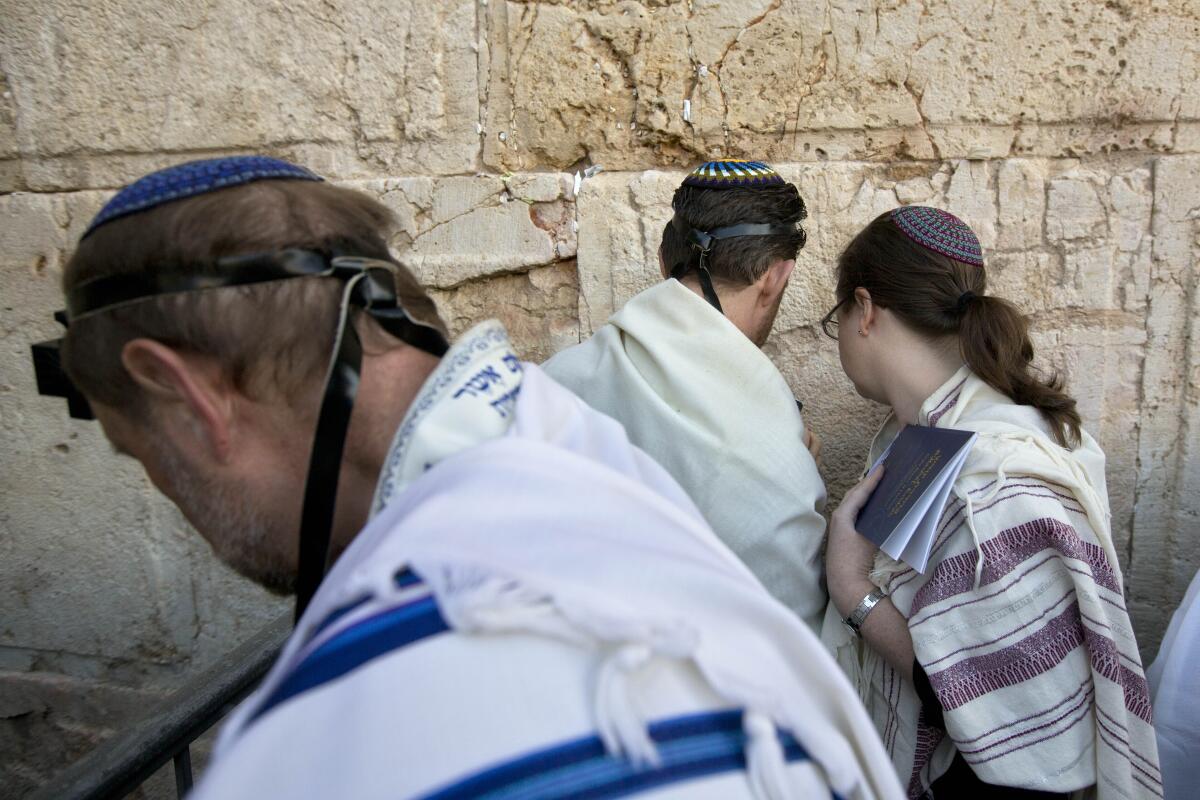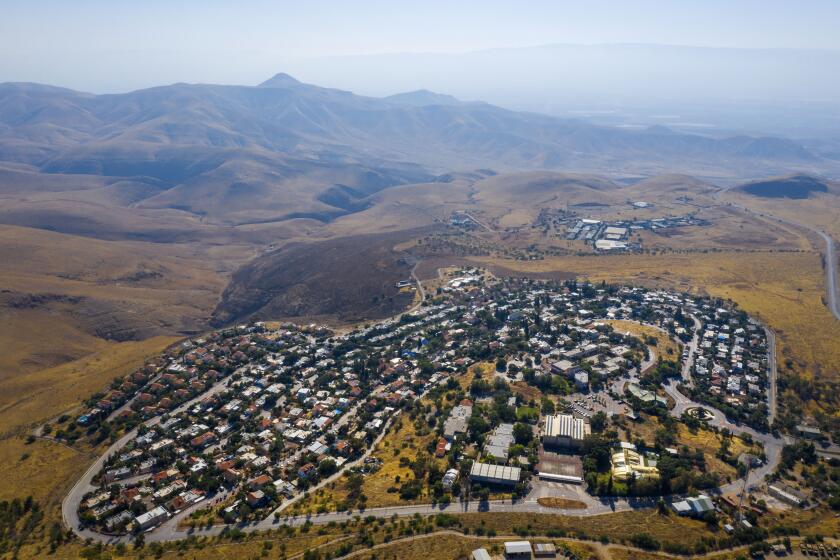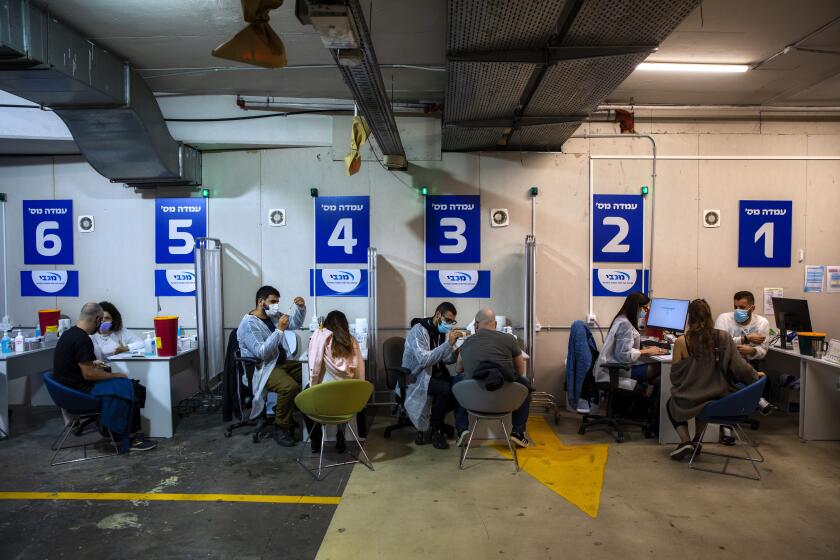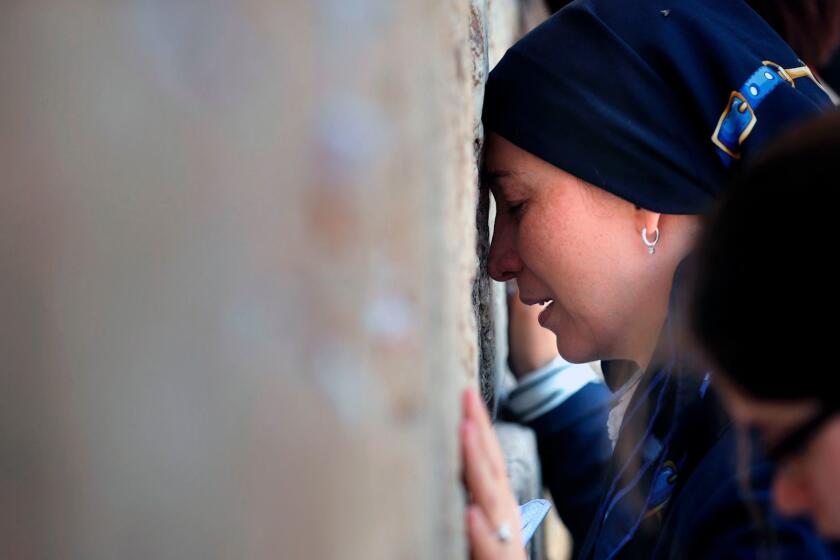Israel’s high court rules that non-Orthodox converts are Jews, entitled to citizenship

- Share via
TEL AVIV — Israel’s Supreme Court has dealt a major blow to the country’s powerful Orthodox establishment, ruling that people who convert to Judaism through the Reform and Conservative movements in Israel are also Jewish and entitled to become citizens.
Monday’s landmark ruling, 15 years in the making, centered on the combustible question of who is Jewish and marked an important victory for the Reform and Conservative movements. These liberal streams of Judaism, which represent the vast majority of affiliated American Jews, have long been marginalized in Israel.
“If the state of Israel claims to be the nation-state of the Jewish world, then the state of Israel must recognize all the denominations of Judaism and imbue them with equality and respect,” said Rabbi Gilad Kariv, head of the Reform movement in Israel and a candidate of the liberal Labor Party in parliamentary elections scheduled for March 23.
Israel’s powerful ultra-Orthodox establishment has held a virtual monopoly on religious matters for Israeli Jews, overseeing rites such as weddings and burials and using its political clout to gain influence over matters like immigration.
Monday’s ruling chipped away at that power by saying that the state must allow Jews who undergo conversions with the liberal movements in Israel to receive citizenship.
“Jews who during their stay in Israel were legally converted in a Reform or Conservative community must be recognized as Jews,” the court said in its majority decision. It said the ruling applied only to the question of citizenship, and did not delve into religious affairs.
A leading Israeli human rights group has begun describing both Israel and its control of the Palestinian territories as a single ‘apartheid’ regime.
Israel previously recognized conversions by the liberal streams conducted overseas. This ruling now applies to conversions inside Israel.
The ruling does not resolve the issues faced by people who qualify for citizenship under the so-called Law of Return but are not considered Jewish under religious law.
The Law of Return grants citizenship to anyone with at least one Jewish grandparent, while religious law requires one to have a Jewish mother. These different definitions have allowed tens of thousands of people, mostly from the former Soviet Union, to immigrate to Israel, only to suffer from discrimination when seeking religious services from the state.
Monday’s ruling directly affects only about 30 people a year, such as spouses of Israeli citizens, advocates say. But both supporters and opponents of the decision said there was much deeper symbolism.
Israel boasts the world’s fastest COVID-19 vaccine rollout, with half the population inoculated. Reaching the other half presents challenges.
“It’s saying that the Jewish world is one,” said Nicole Maor, the lawyer who represented the Reform movement.
“Whoever becomes Jewish in a Reform conversion or something similar is not Jewish,” countered David Lau, one of Israel’s two chief rabbis. “No ruling by the Supreme Court this way or that way will change this fact.”
The ultra-Orthodox are key allies of Prime Minister Benjamin Netanyahu and wield significant political power. Interior Minister Aryeh Deri, leader of the ultra-Orthodox Shas party, condemned the court’s decision, saying it would lead to deep divisions in Israeli society.
“I promise to fix the law to ensure that only conversions under Orthodox religious law will be recognized in the state of Israel,” said Deri, whose ministry is in charge of immigration policies.
Israel’s ultra-Orthodox are key to Benjamin Netanyahu’s bid to stay in power, but their resistance to coronavirus restrictions is causing tensions.
Netanyahu, who is running for reelection, re-posted a tweet from his Likud party saying the decision should be left to ”the people and the Knesset,” the Israeli parliament.
The Reform and Conservative streams of Judaism have had an increasingly tense relationship with Netanyahu, who is riding high on the success of Israel’s vaccination campaign ahead of the election. The Orthodox, including ultra-Orthodox residents who openly flout Netanyahu’s coronavirus-fighting plan, form a key part of his base of supporters.
Netanyahu’s tensions with non-Orthodox movements have risen in recent years. They are underscored by his 2017 decision under heavy Orthodox pressure to cancel plans for an expanded mixed-gender prayer area at the Western Wall, Judaism’s most holy prayer site. Netanyahu’s close ties with his ultra-Orthodox political partners, as well as his strong alliance with former President Trump, further alienated large segments of American Jewry. Most American Jews tend to hold liberal political views.
Avigdor Lieberman, leader of Yisrael Beitenu, a party popular with immigrants from the former USSR, welcomed the ruling. “Yisrael Beitenu will continue to fight against religious coercion and will preserve the character of the State of Israel as a Jewish, liberal Zionist state,” he wrote on Twitter.
When Prime Minister Benjamin Netanyahu’s cabinet voted to renege on a compromise plan for a plaza where women and men could pray together at the Western Wall, the decision was widely viewed as a move to placate ultra-religious parties in the ruling government coalition.
Naftali Bennett, leader of the Yamina party and a candidate for prime minister, said the high court overreached. He advocates a legislative fix.
“The recognition of the State of Israel by conversion will be determined by the democratically elected representatives of the people, and not by jurists,” he tweeted. “Conversion procedures,” he added, should be “institutionalized in law.”
More to Read
Sign up for Essential California
The most important California stories and recommendations in your inbox every morning.
You may occasionally receive promotional content from the Los Angeles Times.

















